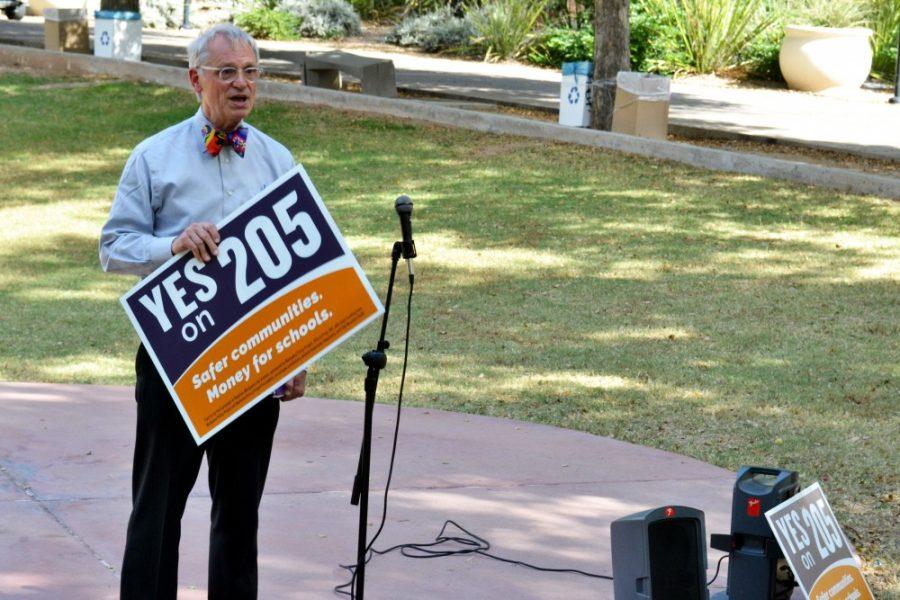Oregon Congressman Earl Blumenauer addressed marijuana legalization for the Yes on Prop 205 campaign Thursday afternoon in the Highland Bowl. The Daily Wildcat spoke with Blumenauer about why he rallies for legalization and how he addresses opposing arguments.
Daily Wildcat: Why are you so passionate about legalizing marijuana?
RELATED: Arizona poised to vote on legal marijuana with Proposition 205 on Nov. 8
Earl Blumenauer: Well, we’ve had a 40-year policy of prohibition that’s failed miserably. I’ve been working on this for years. I’ve never been in a community where people thought marijuana shouldn’t be legal. Marijuana, unlike tobacco, won’t kill you and it’s not highly addictive.
Yet tobacco, killing almost half a million people a year, is widely available in most places for anybody over 18. And yet we’re exerting the heavy hand of the law against something that isn’t as harmful.
Also, it’s very clear that marijuana, particularly medical marijuana, has tremendous therapeutic values. In states where marijuana is more readily available, we prescribe fewer pills. We’ve got a crisis of opioid overdoses—killed over 20,000 people last year.
Nobody died from a marijuana overdose. And yet we’re wrecking lives, particularly of young people—we’re not taking advantage of the therapeutic aspects—and we’re wasting resources by subsidizing drug cartels. Why shouldn’t we legalize it?
DW: The definition of Schedule I drugs is that they don’t have medical use, but marijuana has already been proven to have medical properties. Why is the federal level of government so adamant about changing the definition of marijuana?
EB: You’re right, Schedule I means no therapeutic value, high potential for abuse. Why is marijuana a Schedule I, a higher classification than methamphetamines? Or cocaine? It makes no sense.
The reason we have it is because this was part of a political decision by Richard Nixon and his administration to use this classification for political purposes. They were able to use it as a wedge issue against African Americans and young people, and it was very effective—he got reelected. It was a political decision by politicians, and so far, politicians have been reluctant to change it.
The people haven’t. It’s been the voters that made medical marijuana more widely available, starting in 2012 with adult use in Colorado and Washington and then Oregon and Alaska and the District of Columbia in 2014.
So politicians are nervous. There are vast special interests that was to keep it this way, and you can see that in the campaign here in Arizona. Who’s investing against legalization?
Gee, the pharmaceutical company that’s the largest producer of panthenol, which is highly toxic. We have people who are involved in prison industries.
Last year, we arrested and cited over 560,000 people for marijuana possession at a time where the polls show us that the majority of Americans think it should be legal for adult use. We’re caught in a time warp, which is why the campaign here in Arizona is so important.
DW: There’s also the argument that Propostion 205 would be difficult to amend because it directly changes the Arizona constitution. Do you think Proposition 205 is the right step in getting marijuana legalized, or do you think it needs to be changed a little bit?
EB: Rarely do we have laws that are perfect. I think this is an important step forward to be able to not make otherwise law-abiding citizens into criminals, to be able to open opportunities for business, to be able to provide a product that people want and to make money at it and then have a more honest discussion throughout society about what we want and how we’re going to achieve it.
DW: On the topic of protecting our children, what about the people under 21 who are already smoking? Some people say that legalizing it won’t make a difference in stopping their usage and illegal activity will continue.
RELATED: Community Chatter: Should recreational marijuana be legalized in Arizona?
EB: If it won’t make a difference, why not legalize it and tax it? There’s this vast underground supply because there’s this vast underground market. When we start to tax and regulate, it’ll be easier to actually enforce the law. We’ll be able to have resources to actually be able to deal with real problems, as opposed to right now where we’re wasting resources and this vast black market is just beyond any control.
DW: If you take marijuana out of the picture, how will it effect the war on drugs?
EB: Well it’s really time, generally, to take a hard look at the war on drugs. We’ve spent a trillion dollars on it. Has it gone away? Drug prices are as low or lower than when we started. We’ve got in our prisons tens of thousands on non-violent drug offenders.
Maybe it’s time to readdress some of the bigger picture. Everybody who’s in America who has a drug problem ought to be able to be treated for their addiction. It would be cheaper than locking people up, and it would actually solve the problem. Stop destroying people’s lives for relatively minor offenses so they can be productive.
What’s the solution? I would say education, I would say drug treatment and selective enforcement on things that matter. And most of all, not enriching the cartels so that they can run rampant.
Follow Rocky Baier on Twitter,









